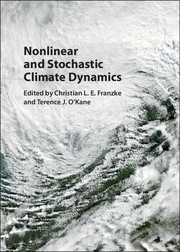Book contents
- Frontmatter
- Contents
- List of Figures
- List of Contributors
- Preface
- 1 Challenges for Ice Age Dynamics: A Dynamical Systems Perspective
- 2 Tipping Points in the Climate System
- 3 Atmospheric Teleconnection Patterns
- 4 Atmospheric Regimes: The Link between Weather and the Large-Scale Circulation
- 5 Low-Frequency Regime Transitions and Predictability of Regimes in a Barotropic Model
- 6 Complex Network Techniques for Climatological Data Analysis
- 7 On Inference and Validation of Causality Relations in Climate Teleconnections
- 8 Stochastic Climate Theory
- 9 Stochastic Subgrid Modelling for Geophysical and Three-Dimensional Turbulence
- 10 Model Error in Data Assimilation
- 11 Long-Term Memory in Climate: Detection, Extreme Events, and Significance of Trends
- 12 Fractional Stochastic Models for Heavy Tailed, and Long-Range Dependent, Fluctuations in Physical Systems
- 13 Modelling Spatial Extremes Using Max-Stable Processes
- 14 Extreme Value Analysis in Dynamical Systems: Two Case Studies
- Index
6 - Complex Network Techniques for Climatological Data Analysis
Published online by Cambridge University Press: 26 January 2017
- Frontmatter
- Contents
- List of Figures
- List of Contributors
- Preface
- 1 Challenges for Ice Age Dynamics: A Dynamical Systems Perspective
- 2 Tipping Points in the Climate System
- 3 Atmospheric Teleconnection Patterns
- 4 Atmospheric Regimes: The Link between Weather and the Large-Scale Circulation
- 5 Low-Frequency Regime Transitions and Predictability of Regimes in a Barotropic Model
- 6 Complex Network Techniques for Climatological Data Analysis
- 7 On Inference and Validation of Causality Relations in Climate Teleconnections
- 8 Stochastic Climate Theory
- 9 Stochastic Subgrid Modelling for Geophysical and Three-Dimensional Turbulence
- 10 Model Error in Data Assimilation
- 11 Long-Term Memory in Climate: Detection, Extreme Events, and Significance of Trends
- 12 Fractional Stochastic Models for Heavy Tailed, and Long-Range Dependent, Fluctuations in Physical Systems
- 13 Modelling Spatial Extremes Using Max-Stable Processes
- 14 Extreme Value Analysis in Dynamical Systems: Two Case Studies
- Index
Summary
Abstract
Complex network theory provides a powerful toolbox for studying the structure of statistical interrelationships between multiple time series in various scientific disciplines. Complementing frequently used methods of eigenanalysis such as empirical orthogonal functions, climate networks allow to flexibly combine advanced nonlinear and informationtheoretical measures for quantifying interactions between climatological time series with manifold concepts and methods from complex network theory. This chapter summarizes the corresponding theoretical foundations as well as recent applications in the field of climate network analysis for different climatic observables, including the treatment of coupled climatological fields and heterogeneous spatial distributions of climate observations.
Introduction
Gaining information on climate variability using sophisticated methods of data analysis is one of the foremost tasks of statistical climatology. Inspired by classical methods from multivariate statistics, a large body of approaches has been utilized in past studies, including empirical orthogonal function (EOF) analysis, maximum covariance analysis (MCA) or canonical correlation analysis (CCA), to mention only some of the most prominent examples (von Storch and Zwiers, 2003). These purely statistical approaches have been successfully applied for studying a broad variety of climatological problems.
However, during recent decades concerns have been raised regarding the methodological limitations of the aforementioned approaches as well as the appropriate interpretation of the resulting findings. A first possible point of criticism is the implicit assumption of linearity of statistical interdependencies underlying methods like EOF analysis and MCA. In order to account for more general statistical relationships, nonlinear generalizations of these methods have been developed, relieving the requirement of linear independence between patterns to be addressed. Corresponding approaches include isometric feature mapping (Isomap, Tenenbaum et al. (2000); Gámez et al. (2004)), nonlinear (neural network-based) principal component analysis (Hsieh, 2004, 2009), and a variety of other techniques based on machine learning principal component analysis (Hsieh, 2004, 2009).
In addition to the linearity assumption, Monahan et al. (2009) identified several concerns regarding the interpretation of modes revealed by EOF analysis (which apply in a similar spirit also to other established techniques of statistical climatology).
- Type
- Chapter
- Information
- Nonlinear and Stochastic Climate Dynamics , pp. 159 - 183Publisher: Cambridge University PressPrint publication year: 2017
- 13
- Cited by



